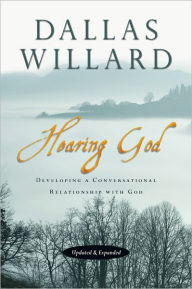Dallas Willard: Hearing God
A guest review by Evangelist David Hernandez.
 Dallas Willard, Hearing God: Developing a Conversational Relationship with God (InterVarsity Press, 1999 and 2012) 304 pages, ISBN 9780830835690.
Dallas Willard, Hearing God: Developing a Conversational Relationship with God (InterVarsity Press, 1999 and 2012) 304 pages, ISBN 9780830835690.
Many Christian leaders will agree with the saying that prayer is a two-way conversation with God, yet very few have ever experienced this type of relationship with our Lord. For me, prayer is very important and I actually view it as the most important spiritual discipline. In churches, we worship with the body of Christ, and in reading Scripture, we are reading God’s holy word. But only in prayer do we kneel before the God of the universe, and talk to Him. Every Christian believes we can do that, but what happens when He talks back?
The late Dallas Willard’s take on this is a very impressive perspective in the evangelical outlook. Many times you’ll believe he was a Pentecostal/Charismatic himself. I don’t what his views were on this, but this book makes him sound like it, though I don’t think he was. He writes in the first chapter how we teach the Christian view that God wants a personal relationship with us, yet when we think about it or of people who’ve had these experiences of God speaking to them, we immediately have the UFO syndrome. We are skeptical of the very teachings we teach. He tells how God can communicate to us in many ways like Charles Carrin wrote.[1] One thing I learned throughout the book is that God will not speak to us if we’re always searching our own motives. Our motive is to seek God for himself and his guidance, not just so he can relieve the anxiety of our uncertainty of the future.
One myth that he knocks down is the belief that if God really spoke to you, you would know it for sure. He places the example of Samuel when he was a boy and heard the voice that was calling out to him. He runs to the high priest, and it was the high priest who perceived that God was speaking to the boy, not the boy himself. We must learn in our daily experience how to listen to God and really “practice the presence of God” as Brother Lawrence wrote. This is not to say that we should always go looking for supernatural experiences, but that we should open ourselves to the Holy Spirit more as He speaks to us. One thing I’ve taught others in ministry is that God is a speaking God and we must open ourselves to Him. Unfortunately, humanism and skepticism has crept into the Western church, and many have basically become biblical deists. As Roger Olson wrote, we’ve sought to become a respectable religion, but Christianity by its very nature is a supernatural one.[2]

Dallas Willard (1935-2013) was a philosopher best known for his books on spiritual formation including The Divine Conspiracy: Rediscovering Our Hidden Life in God (1998) and Renovation of the Heart: Putting On the Character of Christ (2002).
Willard goes on to present principles that will help us in our walk with God. One main one is to stay very close to the Word of God. We will know for sure that if something or someone speaks contrary to the Word, it is not of God. It can be our own human thoughts or worse, of demonic origin. But even then, this should not scare us from listening to God. He writes about the “still, small voice” that God can use to speak to us with. The thing about this voice is that though it was still and small, the information it carried was still clearly perceived. He makes clear that thoughts which we debate within ourselves are not the voice of God, unless of course those “voices” are trying to deliver you from sin or from a certain evil or from bad decisions. Any voice that promises a life void of pain and suffering is certainly not from God.
Many go to God only for big decisions in life (career, marriage, etc.) but we have people like David inquiring God for certain strategies (1 Chronicles 14). We can have the confidence and faith that God can do so with us. What about when God doesn’t speak to us? There can be various reasons for this. For example, you already know the choice but are seeking more affirmation. Maybe God has laid out various choices for you to decide and each is correct. Or there is a hindrance (like sin) that we need to get rid of so we can listen to God. Listening to God is not a formula taught, but a life experienced. You only know someone when you learn to recognize their voice, before that they were unnoticed in your life and mind. So also with God, we must learn to recognize His voice by experience, sometimes with trial and error, though mercy is always offered. When we believe and have the faith that God can and will speak to us, than we can develop a conversational relationship with God.
Reviewed by David Hernandez
Notes
- http://pneumareview.com/six-ways-the-holy-spirit-will-communicate-with-you-by-charles-carrin/
- http://pneumareview.com/roger-olson-embarrassed-by-the-supernatural/
Category: Living the Faith


